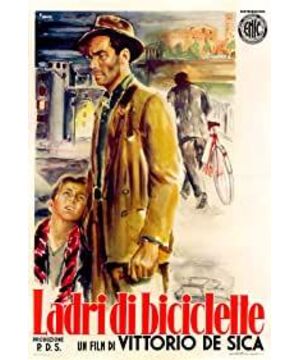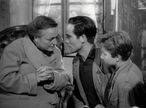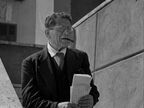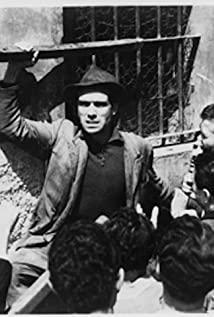"Tagging" tends to detract from the intrinsic dimension of a movie, but if the movie happens to be the personification of the tag, it will explain exactly what the tag actually means. The neorealist film "Label" has earned Italy a worldwide reputation, and The Bicycle Thief is a perfect neorealist work: the real life here and now, the real experience of ordinary people, a lot of unrefined detail. The objective reproduction of reality is a common feature of all realist works, and the intuitiveness of the film undoubtedly allows this reproduction to achieve a highly realistic effect. Rome, a city reminiscent of glory and greatness, was plunged into widespread poverty after the war. There doesn't seem to be any Roman landmarks in the film. What it shows is only dilapidated streets, rooms with four walls, a messy bicycle market, pedestrians running around in a rainy day, and all kinds of packages in the pawnshop are piled up like a hill... This is not The romantic capital in "Roman Holiday" is the Asura field where ordinary people struggle and eat each other in poverty. How blissful is it to be able to improve your life in such difficult times, and how cruel is it to be shattered? The owner Kiki lost the key to improving his life - the bicycle. No bicycle means unemployment again. The meaning of the bicycle to him is not a simple tool, but does anyone else understand? In order to retrieve the bicycle, he successively resorted to four kinds of forces: the police, his friends, the goddess, and himself. The police represent the government or the legal system. The reality is that their corpses are vegan, and they are treated indifferently on the grounds of business affairs and lack of evidence. "It's just a bicycle." How harsh would this sentence sound to the male host? Twice he endured the police's perfunctory response, and the third time (at the thief's house) he finally said angrily: "You have no idea what this means to me!" The thief was caught but there was no way to take him. His bicycle had long been disassembled and reassembled, which undoubtedly declared the bankruptcy of the three schemes of community, religion, and personal heroism. He clasped his hands as he left the thief's house, a detail that silently expressed his extreme anger, not even noticing that his son was nearly hit by a car. The question of "what to do" tormented him. A pile of bicycles and a bicycle shot alternately. The shouts of the stadium in the distance came one after another. He wandered back and forth, hesitating, and finally took the risk. The Bicycle Man, the title of the movie shows its true meaning at this time. His luck is that the person who lost the car in the end was moved by his son's pleading and let him go. This is undoubtedly an unexpected comfort to him, and it is also the hope that the director left to the audience. poverty Indifference can be produced with abundance, and an important feature of Western modernism in the twentieth century is this omnipresent indifference. Apart from family members and individual friends, the hero has always encountered indifference: indifferent employers (without a bicycle, no job), indifferent police officers (without evidence I cannot arrest people), indifferent thieves (I am poor so I have to harm others and benefit myself) Because of this, even if the specific historical situation that produced this film is removed, the plight of people in society it shows is still real and cruel. Things that are vital to you, even life and death, may not be worth mentioning in the eyes of others. Is it simply to blame society, or to explore the possibility of human nature, or even treat everything as a game of genes? Yet it is not a work of despair, nor is it merely critical. In addition to the unexpected forgiveness, the biggest warmth in the whole play comes from the simple and lovely son. The son always loves him, and no matter what he does, he will never let go and hold his hand. A lot of details in the film depict the emotions between father and son, which are enough to make people cry. I don't know if this love can re-save or rebuild everything, but at least there is a glimmer of hope. Although there are factors beyond the times (such as the performance of "indifference") escorting, but after the passage of time, the real encounter of the protagonist will be ignored intentionally or unintentionally. In order to say something new, critics sometimes discover the taste of "the maturity and poetry of urban images" in the lens of impoverished Rome, and those images are actually only part of the representation of reality, the meaning is only to highlight the theme with the plausibility of details the truth. The foothold of realism is not the copying of the superficial, but the truth of human nature. The indifference that the protagonist encounters in the film will be resurrected and replicated in the way of appreciating the most important things. Although this may not be the original intention of the critics, it prompts me to reflect: as long as my feelings are true, why should I care about whether it is related to other people’s comments ( Including the mainstream "conclusion") repetition? If the "old insights" can be explained more thoroughly, why bother to pursue "new feelings"? At the end of the film, the ashamed and weeping male protagonist took his son's hand and disappeared into the vast crowd. What will happen to them in the future, no one knows. After the curtain falls, how long can we stay out of the theater, even if we have a strong sense of sympathy? When we rewatch it, do we no longer care about that man's tragic fate? The improvement at the system level is not a cause that everyone has the enthusiasm and ability to participate in. Perhaps for ordinary people, they know how many difficulties they have not experienced in the world, and then understand the difficulty of other people's lives, and help others as much as they can. Will suffice. In the face of bicycle thieves, my ability may be limited, but I better not be indifferent, let alone harm others and benefit myself
View more about Bicycle Thieves reviews











